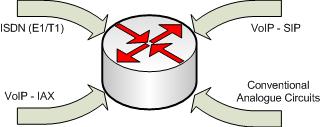Basic Function of a VoIP Gateway
A VoIP gateway provides the interface between the IP telephony network and the conventional public switched telephone network (PSTN). For example, a gateway can be used to link a VoIP call to a PRI-30 ISDN trunk, a BRI two channel ISDN circuit or an analogue line.
In fact, a gateway can be used as the interface between any disparate telephony protocols. It might provide the bridge between analogue and digital circuits or allow VoIP calls using the SIP protocol to connect to remote peers using the IAX protocol. If it supports “transcoding”, then a gateway may also be used to interconnect end points that would not otherwise be able to negotiate a common codec.
Dial Plans – Intelligent Routing of Calls
All but the most basic of gateways will have a configurable set of rules that are used to determine the correct path for each new call that arrives on the system. The rules can range from very simple ones like “every call arriving on port 1 send it out on port 2” to quite complex decisions based on examination of the dialed number, the caller id and the current status of the connections and ports available.
Smartvox can provide SIP proxy server solutions based on OpenSIPS. These may use hard-coded pre-set internal rules to determine routing and call delivery, but we also offer the option to link the proxy to an Application Server. Using this option, the logic for all routing decisions is pushed out to the Application Server thereby giving you almost unlimited flexibility.
Do I need to have my own gateway?
The simple answer is no. You can have an IP phone that registers directly with a remote VoIP Service Provider through the Internet (a so-called hosted service). When you make a call, the IP phone will send the request to your VoIP Service Provider and your call can reach the entire public telephone network because your Service Provider has a PSTN gateway – this means you don’t need one on your premises.
However, if you want a more sophisticated solution that is completely within your control and hosted on your premises then a gateway, or a PBX that acts as a gateway, may be the right solution for you. Just about every new PBX these days is IP enabled. This could mean they support VoIP trunk connections, IP phones as extensions or both.
For small and medium sized businesses that do not want the expense and disruption of replacing existing telephony equipment (PBX, phones, cabling etc), the addition of a VoIP gateway might make sense to provide some backup resilience, to save on outbound call costs and even to allow new DDI’s to be routed into the existing telephone system. However, as legacy telephone systems reach the end of their life or become uneconomic, it generally makes more sense to outsource the entire operation and use one of the many hosted telephony/hosted PBX solutions available.
In some cases, a VoIP gateway may be the right solution for connecting the telephones in a small branch office to those in other branches or to the main PBX located at a head office. This can be quite an economic solution because it leverages existing broadband capacity to transmit and receive voice calls over the Internet. However, care must be taken to ensure peaks in data use do not interfere with the quality of the voice services where broadband capacity is being shared.
Session Border Controllers
When a gateway is used as the interface between the Internet and a private network segment, along with rules to control connections between the two, then it is known as a Session Border Controller or SBC.
Some products marketed as Session Border Controllers also include other facilities such as SIP Proxy, Registrar and Location server. While a basic SBC may be a useful addition for a business that wants to allow controlled access to its IP enabled PBX, the more sophisticated versions with additional features are expensive and are mostly aimed at Service Providers or larger enterprises.
